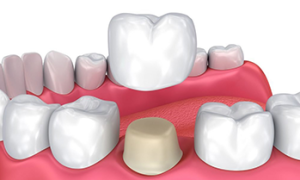Dental crowns are a common restorative treatment used to protect, strengthen, and improve the appearance of damaged teeth. They are versatile and can be made from various materials including porcelain, metal, resin, or ceramic. Like any dental treatment, dental crowns come with both advantages and disadvantages. Below, we explore the key points to help you make an informed decision.
Advantages
- Durability and Strength:
- Dental crowns provide a robust solution for restoring severely damaged or weakened teeth.
- They are designed to withstand daily chewing forces, making them a long-lasting option.
- Aesthetic Improvement:
- Porcelain and ceramic crowns offer a natural appearance that blends seamlessly with your existing teeth.
- They can be color-matched to your natural tooth shade, enhancing your smile.
- Protection and Restoration:
- Crowns cover the entire visible portion of the tooth, protecting it from further decay or damage.
- They are often used after root canal treatments or to cap dental implants, ensuring a restored function.
- Versatility:
- Suitable for various dental issues including fractures, severe decay, and after large fillings.
- Can be used to improve the shape, size, and alignment of a tooth.
- Custom Fit:
- Dental crowns are custom-made to fit your mouth perfectly, ensuring comfort and functionality.
- Modern digital scanning techniques enhance precision, reducing the need for multiple fittings.


Disadvantages
- Cost:
- Dental crowns can be relatively expensive, and insurance coverage may vary.
- The cost depends on the material used, with porcelain and ceramic options typically being pricier.
- Multiple Appointments:
- The process usually involves at least two visits: one for tooth preparation and impressions, and another for crown placement.
- Temporary crowns are often used, which might be less durable and less aesthetic than the final crown.
- Potential Sensitivity:
- After the procedure, some patients may experience temporary tooth sensitivity, especially to temperature changes.
- In rare cases, improper fitting can lead to prolonged discomfort or gum irritation.
- Risk of Damage or Decay:
- Although crowns are durable, they can still chip or break under excessive force.
- The tooth under the crown can still decay if proper oral hygiene is not maintained.
- Irreversible Process:
- Preparing a tooth for a crown involves the removal of a significant amount of natural tooth structure, making it irreversible.
- Once crowned, the natural tooth is forever altered, and the crown will need to be replaced after several years due to wear.
Dental crowns offer a highly effective solution for restoring dental function and aesthetics. However, it’s essential to weigh their advantages against potential drawbacks and discuss with your dentist to determine if this treatment is right for you.


